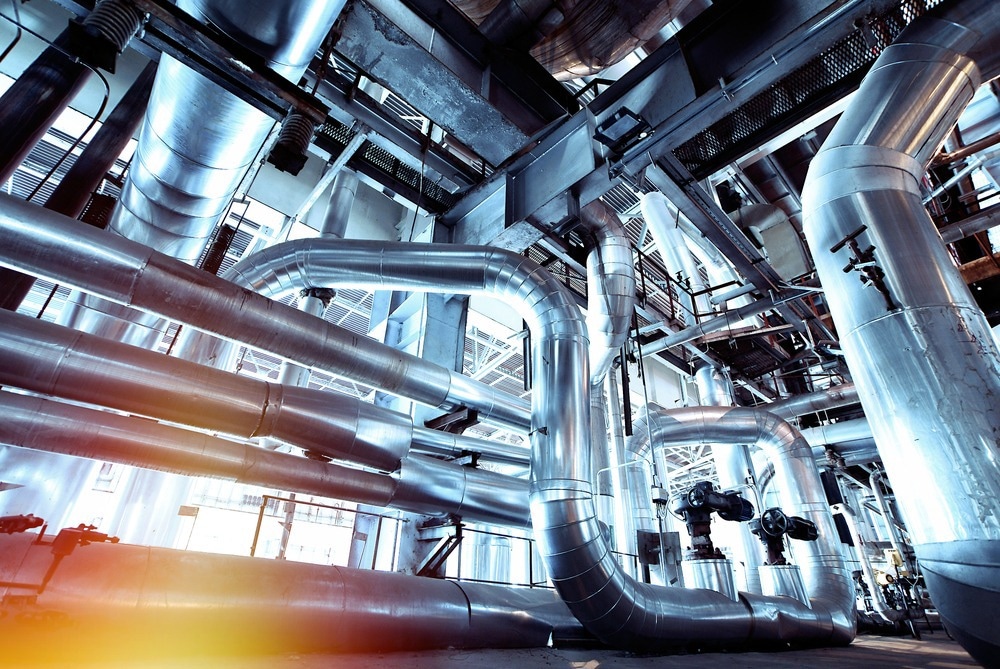Manufacturing industrial chemicals is renowned for its complexity, high level of automation, and need for accuracy and precision. In recent years, robots have emerged as an increasingly popular tool in industrial chemical production by improving to the point where they can now effectively operate in these hazardous and challenging environments, offering significant benefits for the industry. This article discusses the use of robots in industrial chemical production and the current commercial landscape.

Image Credit: nostal6ie/Shutterstock.com
Robots have been used in chemical production for decades. Still, recent advancements in robotics technology have made them more flexible, efficient, and safe and enable them to perform repetitive tasks with high precision and consistency, reducing the risk of errors and ensuring high-quality standards. In addition, robots can operate without risking human health and safety in hazardous environments where human operators could be exposed to toxic chemicals, extreme temperatures, or other dangerous conditions, reducing the likelihood of accidents and injuries.
Advantages of Robots in Industrial Chemical Production
Robots are used in many different phases of industrial chemical production, including mixing, blending, packing, testing, material handling, transportation, and logistics.
Aerial Safety Inspection
Robots have been extensively used in chemical plants for aerial safety inspections that cannot be conducted otherwise without risk. For instance, before, an inspection of stacks required plant shutdown for stacks to be cooled, whereas now chemical plants use robotic drones with sensors and cameras to inspect stacks without interrupting the regular plant functioning.
Chemical Tank Cleaning
Chemical tank cleaning is hazardous for chemical plant workers since it involves hazards like toxic fumes and working in confined spaces. Before robots, plant workers had to wear complete personal protective equipment (PPE) to enter the tanks and come out quickly to avoid hazards that can affect human health and PPE. This process was very risky and time-consuming, affecting product quality. However, with the introduction of remote-controlled robots, this process can be done more easily, effectively and without affecting production.
Robots with Thermal Imaging Cameras
Chemical plants are filled with tanks, pipes and other equipment that contain flammable chemicals, which can cause fire or explosion upon a rise in the environment's temperature. Robots equipped with adjustable sensors and thermal imaging cameras are used in sensitive areas of chemical plants to alert employees of any forthcoming danger.
Major Industries that Utilize Robots in Chemical Production and Handling
Fertilizer Industry
Leading companies in the fertilizer industry have been using robots for quite a while now. The mixing of chemicals for fertilizers production requires high precision and accuracy. Robots are used to automate the mixing process, ensuring that the correct proportions of chemicals are used consistently, improving efficiency, reducing waste and saving costs for fertilizer manufacturers.
Pharmaceutical Industry
Strict quality control is paramount to ensure the safety and effectiveness of the drugs. Therefore, big pharmaceutical companies are also utilizing robotics to automate pharmaceutical production, which helps them reduce the risk of errors and inconsistency and improve drug quality. Moreover, robots are also used to fill capsules, inspect vials for defects, and package drugs.
Similarly, the use of robots in the chemical industry is not limited to large companies only since research advancement in robotics has allowed small and medium-sized enterprises (SMEs) to afford and use advanced robots.
Leading Robot Manufacturers
ABB Industrial Robots
ABB is a global leader in robotics and automation, offering a wide range of solutions for chemical production with many applications, including material handling, packaging, and testing, with high precision, reliability, and safety features. For instance, their robots IRB360, IRB365 and IRB390 are used in the food and beverages industry for precise and accurate picking and packing operations.
KUKA Robotics
KUKA is a German robot manufacturing company offering robots and automation solutions for chemical products with high speed, precision, and flexibility. For instance, KUKA has introduced novel KUKA Hygienic Oil (HO) portfolio and Hygienic Machine (HM) variants in 2021 that are ideal for applications that prioritize hygiene since these robots use food-compatible lubricants in all axes.
FANUC Global
FANUC Global is another robot manufacturing company in Japan that provides automation and robot facilities to several industries, including chemical production. Some of the most common applications of FANUC robots in the chemical industry are material handling, quality control, packaging, and shipping.
Universal Robots
Universal Robots is another company that provides collaborative robots (cobots) for chemical products that are lightweight, easy to program, and have a small footprint, allowing for greater flexibility and adaptability in production processes, making them ideal for use in small and medium-sized enterprises.
Future Prospects
Overall, the use of robots in industrial chemical production is a growing trend that is expected to evolve more with advancements in robotics technology. Although robots' usage in chemical production has many benefits, including increased efficiency, improved safety, and enhanced quality control, there are also challenges associated with using robotics systems, including the high cost of investment and the need for specialized skills and knowledge. However, as the technology continues to evolve, the cost of implementation is expected to decrease, making it more accessible to small and medium-sized enterprises.
References and Further Reading
Biron, J (2023). Top 5 reasons to use robots in the chemical industry. [Online]
Cobots from Universal Robots. [Online] Available at: https://www.universal-robots.com/
Fanuc Corporation Global. [Online] Available at: https://www.fanuc.com/
Fiorini, P., & Botturi, D. (2008). Introducing service robotics to the pharmaceutical industry. Intelligent Service Robotics. https://link.springer.com/article/10.1007/s11370-008-0019-2
Iqbal, J., Khan, Z. H., & Khalid, A. (2017). Prospects of robotics in food industry. Food Science and Technology. https://www.scielo.br/j/cta/a/g8Vvv8rW7D7rsfwctx9gmvc/?lang=en
Kuka robotic technology guarantees the highest standards of Hygiene. [Online] Available at: https://www.kuka.com/en-us/company/press/news/2021/10/robotic-technology-hygienic-design-h1-lubricants
Meaux, C. (2020). Robotics in the Chemical Industry: Keep Employees Safe. [Online] Available at: https://industrytoday.com/robotics-in-the-chemical-industry-keep-employees-safe/
Robotic Solutions for Food & Beverage: ABB Robotics. [Online] Available at: https://new.abb.com/products/robotics/industries/food-and-beverage
Disclaimer: The views expressed here are those of the author expressed in their private capacity and do not necessarily represent the views of AZoM.com Limited T/A AZoNetwork the owner and operator of this website. This disclaimer forms part of the Terms and conditions of use of this website.